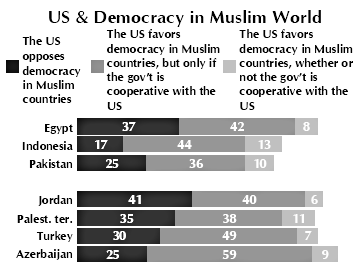PIPA’s latest survey of attitudes in Muslim countries is out, and for the most part there are few surprises. Long story short, most respondents don’t approve of attacks on American civilians (though they largely do approve of attacks on soldiers), but that’s about it for the good news.  Broadly speaking, they don’t like the U.S., don’t like our presence in the Middle East, and think al-Qaeda’s goals (if not its methods) are admirable.
Broadly speaking, they don’t like the U.S., don’t like our presence in the Middle East, and think al-Qaeda’s goals (if not its methods) are admirable.
The chart on the right demonstrates the depth of our problem. Virtually no one believes that the United States truly supports democracy in Muslim countries, and who can blame them? We don’t — and all the airy talk in the world won’t change that. Only genuine change will. Marc Lynch:
The most important starting point is to recognise that American policy is the most critical issue. No amount of public diplomacy will convince Arabs or Muslims to embrace American actions they detest. The Bush administration’s conception of public diplomacy generally involved putting lipstick on a pig — attempting to sell policies formulated in isolation from their likely reception. Even when public diplomacy officials had a seat at the table, they have had little influence on shaping decisions.
Improved public diplomacy from Obama — including his still unscheduled big speech in a Muslim capital — will be valuable, but only if it’s accompanied by policy changes as well. Getting out of Iraq will help. Seriously engaging in the Israeli-Palestinian peace process will help. And supporting democracy more consistently will help. But if the PIPA poll is accurate, it’s going to be a long, hard slog. There’s a helluva lot of ground to be made up.


















